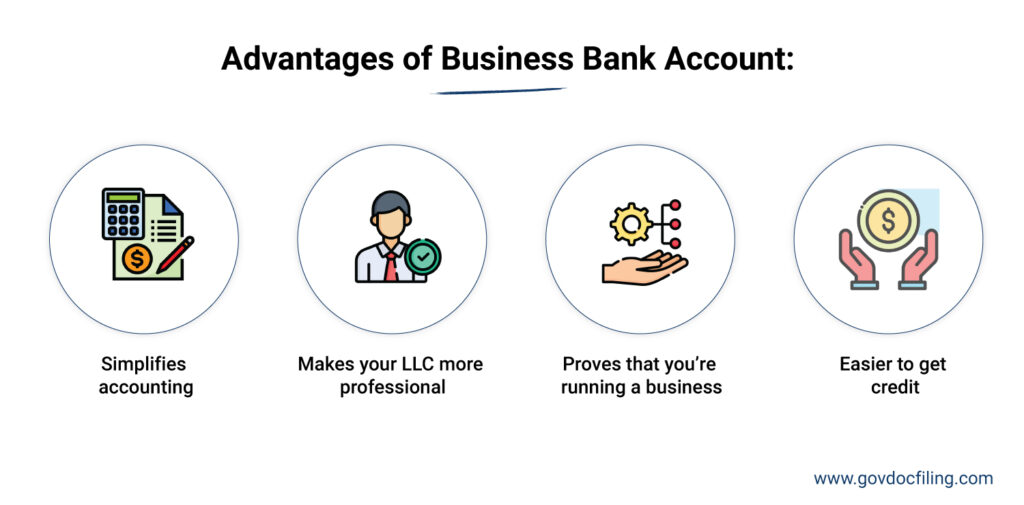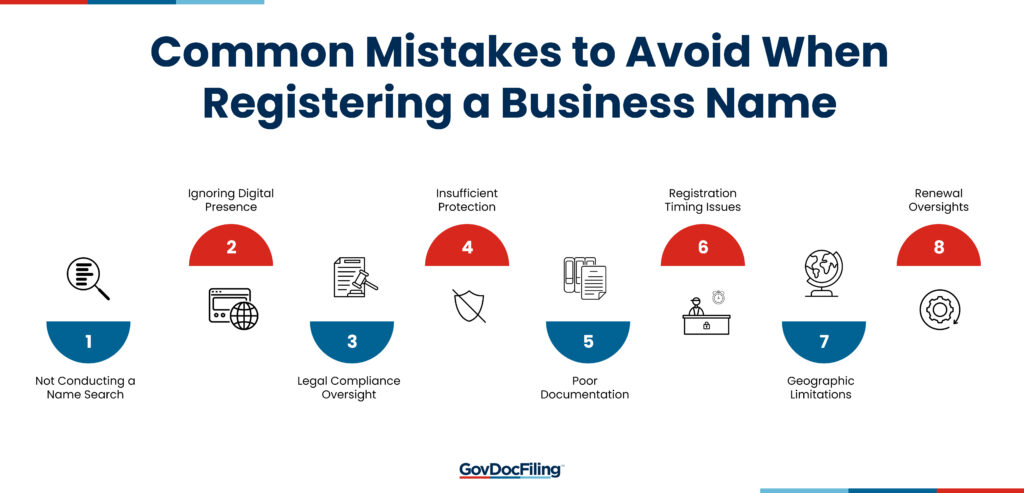Starting a new business is exciting, but navigating the legal requirements can feel overwhelming. One of the first crucial things you’ll need to tackle is learning how to register a business name in your state.
This process, while sometimes complex, is essential for establishing your company’s legal identity and protecting your brand.
Whether launching a small local shop or planning to expand nationwide, properly registering your business name helps prevent legal issues. It also gives you the foundation you need to build a successful business.
In this guide, we will walk you through the entire process of how to register a business name, from the initial search to the final documentation. Ultimately, you should feel confident about navigating the entire business registration process with clarity and peace of mind.
Why Should You Register a Business Name?

Before we go into the details of how to register a business name, let’s take a look at why it is necessary. The following are the reasons why you need to register a business name.
Access to Capital
When you register a business name, traditional lenders and investors are more likely to take your venture seriously for funding opportunities. A registered business name strengthens your applications for small business loans, lines of credit, and investment capital.
Registered businesses often receive preferential consideration from banks and financial institutions when seeking business expansion or operational funding.
The formal registration process creates a documented business history that lenders can evaluate when determining creditworthiness and loan terms.
Tax Benefits
Taking time to register a business name brings valuable tax advantages, especially if you form a corporation. You can deduct legitimate business expenses from your income, including office supplies, equipment, and marketing costs.
A registered business allows you to track expenses separately from personal finances, making tax time smoother. You might qualify for specific business tax credits and deductions unavailable to individuals.
When your business is officially registered, it not only builds trust with the IRS but also makes tax season much more straightforward. These benefits can lead to significant savings and better financial organization throughout the tax year.
Legitimacy for Partnerships
When you register a business name, it gives you credibility when forming partnerships with suppliers, distributors, and other companies in your industry.
Legal registration demonstrates commitment and professionalism, making established companies more willing to enter contractual agreements with your business.
Major retailers and distributors often require proof of business registration before considering stocking your products or services.
Registration provides essential documentation for creating binding contracts and establishing clear terms in business-to-business relationships.
Your registered business name becomes a verifiable entity that partners can reference when conducting due diligence before collaboration.
Efficient Busienss Operations
When you register a business name, you establish a clear foundation for all your business operations. This simple step streamlines your paperwork, banking, and vendor relationships.
Having a registered business name makes it easier to set up business accounts, process payments, and handle shipping documents. It also helps you manage inventory tracking and order fulfillment more efficiently.
Your registered name becomes your official business identity. This official recognition helps prevent confusion and delays in your daily logistics operations. It makes coordinating with suppliers, managing customer orders, and organizing delivery schedules easy.
Access to Creator Programs
Looking to join exclusive creator programs? The first step is to register a business name in the US.
Many platforms like Amazon, TikTok, and YouTube require official business credentials before accepting creators into their monetization programs. A registered business name opens doors to these opportunities, helping you earn from your content.
Moreover, it makes you look more professional to potential partners and sponsors. This simple step can transform your creative passion into a legitimate business venture. It will also give you access to tools and resources reserved for registered businesses.
Now that you know what you stand to gain by registering your business name, should everyone do it? This leads us to the next section.
Do You Need to Register a Business Name?
Whether or not you need to register a business name will depend on your specific situation. For instance, do you intend to use your legal name? If the answer is yes, then you can start your business immediately as a sole proprietorship without registering with your state.
If you don’t want to use your legal name, you can get a DBA (Doing Business As) by filling out a form with your local county clerk.
However, you will need to register your business name with your state if any of the following scenarios apply to you:
- If your company has a physical location or presence in the state
- If you meet with your clients or employees frequently in the state
- If a significant portion of your revenue comes from the state
- If most of your employees work in the state
Assuming the above applies to you, you now need to consider how you will structure your business.
Also Read:
Types of Business Structures
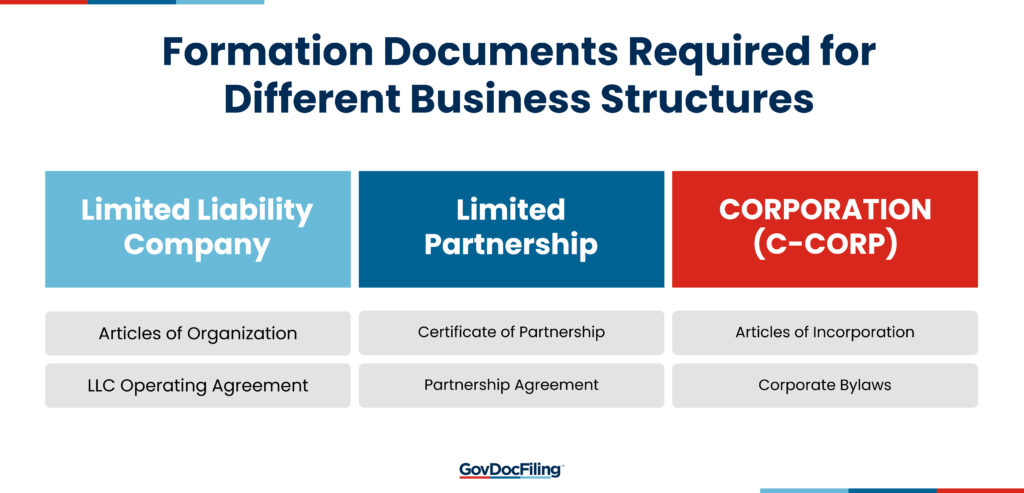
Before you register a business name with the local government, you need to decide which business entity or structure you want to establish. There are several business structures to choose from, and each one has its pros and cons.
Let’s discuss them briefly.
Limited Liability Company (LLC)
This is the most popular business structure in the United States. The major pro of a limited liability company is that it offers protection for your personal assets. To officially register this entity, you’ll need two types of legal documents:
- The Articles of Organization: A simple document that describes the basics of your LLC, like the company’s name, address, management structure, associated members, and the registered agent.
- Operating Agreement: This document is mandatory in some states and optional in others. However, it is advisable to have one. An operating agreement describes exactly how your business will operate—how key decisions will be made, the responsibilities of each member, adding new members, and so on.
Also Read:
Limited Partnership (LP)
A limited partnership is a business entity with a general partner and a limited partner. The general partner is liable and manages the business, while the limited partners are only liable for their shares of investment in the business.
The main advantage of an LP is you can easily partner with investors who want to remain passive and, therefore, have only limited liability. The disadvantage is that the general partner has no personal legal protection.
You need two types of documents to register a business name with this structure. They are:
- A Certificate of Partnership: This is similar to an LLC’s Article of Organization, where you provide basic company information, such as the name, address, partners’ information, and the registered agent’s details.
- Partnership Agreement: This is a binding agreement between all the business partners regarding how the business will operate. It outlines the roles, responsibilities, profit-sharing arrangements, and decision-making processes for all partners involved.
Also Read:
Corporation
A corporation is a legal entity completely separate from its owners. It offers the strongest personal liability protection and the ability to raise capital through stock sales. To register a corporation, you’ll need these key documents:
- Articles of Incorporation: It includes the business name, its purpose, the number of shares issued, the value of those shares, and the board members.
- Corporate Bylaws: This states how the corporation will be governed internally, including shareholders’ duties, powers, and responsibilities.
These are the common business entities to consider before you register a business name.
Also Read:
How to Register a Business Name: Step-By-Step Guide
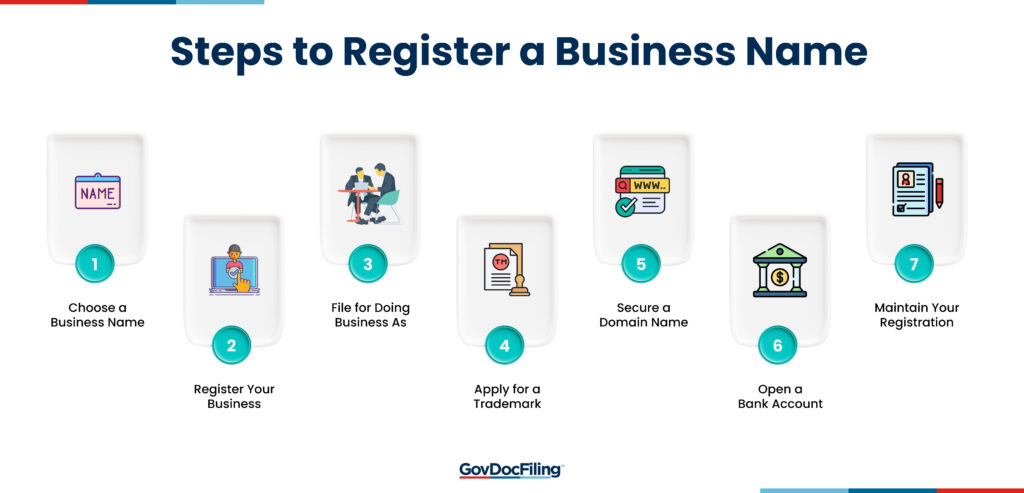
If you want to learn how to register a business name, follow this step-by-step guide.
1. Choose the Right Business Name
Before you register a business name, you choose a good business name.
Ideally, your business name should represent your business and be relevant. It should also be short, easy to spell, and easy to remember if you want it to become a household name.
You can’t use a name that is being used by any other business in your state, so you need to check your state’s database to check for the availability of your chosen name.
Also Read:
2. Register Your Business
Once you’ve found the perfect name for your business, you need to choose a business entity and register it with your state. Choose from the different types of business structures we discussed earlier. This includes sole proprietorship, LLC, corporation, limited partnership, or limited liability partnership based on your specific business needs and goals.
The next step is to register a business name. This involves filing the appropriate registration documents with your state’s Secretary of State office or relevant business registration authority.
How to Register a Business Name at the Federal vs State Level
Every business will operate at the federal or state level. Here’s what you need to know about how to register a business name at both levels.
Federal
Most businesses don’t typically need to register a business name when registering with federal agencies. You only need to apply for a federal tax ID or EIN (Employer Identification Number).
Here are the four ways you can apply for one.
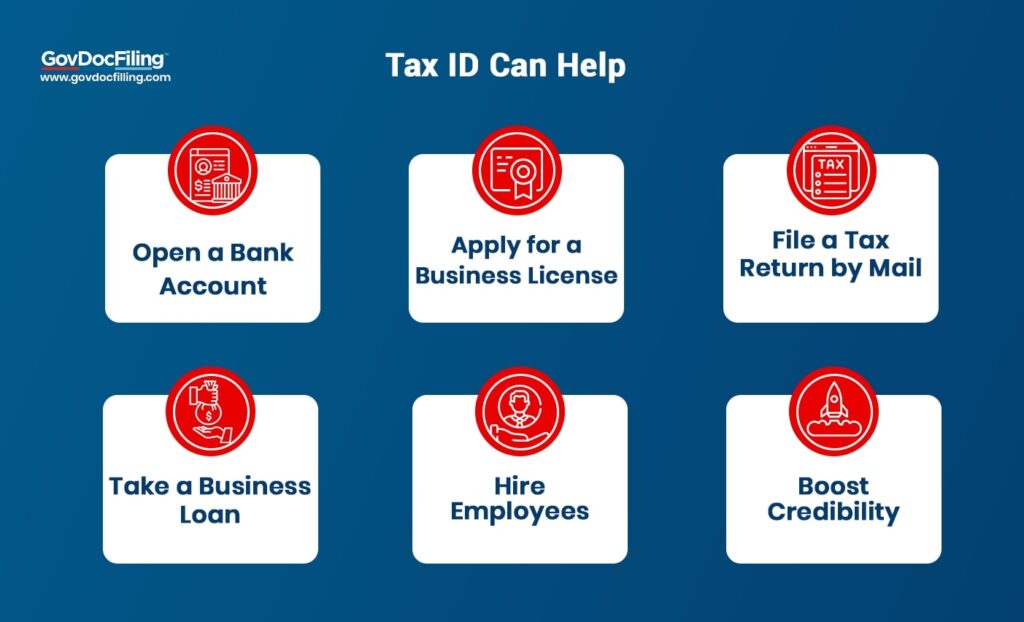
It helps identify your business for tax purposes. Also, it’s required when hiring employees, opening business bank accounts, or applying for licenses and permits.
To apply for a tax ID or EIN, visit GovDocFiling and complete our online application form. The process is easy and expedited.
State
Registration at the state level usually involves registering with your Secretary of State’s office, a Business Agency, or a Business Bureau.
This can be done alongside your federal registration with GovDocFiling. Rather than paying a lawyer or accountant, our online service can quickly and affordably handle all your federal and state registration needs.
Next, you will need to check your state’s specific requirements and file the paperwork with a complete application.
When you register your business, you will also need to provide your business name. As such, your business name automatically gets registered when you register your business.
There are, however, other ways of registering your business name, which we’ll discuss below.
3. File for Doing Business As (DBA)
If you want to use a name other than your legal business name to run your day-to-day business operations, you can file a DBA.
This allows you to use an assumed name (aka trade name) that you can use to run your business.
The reason many business owners opt for this method of registering a business name is that this allows them to use a short and simple name. The legal business names can be long and might indicate the type of business using words like LLC or incorporated.
Sole proprietors may especially prefer this as in some states they are required to use their personal name for their business. To maintain their privacy, they may choose to run their business under an assumed name.
Also Read:
4. Apply for a Trademark
Trademarking is not just a way to register a business name, but to protect your name and business identity from being copied by others.
You can trademark your business name, logo, slogan, colors, and other brand identity elements to protect your business. You may apply for a federal or state trademark, as needed.
5. Secure a Domain Name
Every business needs a well-designed website with a domain name that matches its business name. When you register your business name, you should also secure a domain name that you can use for your website.
A domain name is the identifying address of your website on the internet and should ideally be as similar to your business name as possible.
Also Read:
6. Open a Bank Account
After you register a business name and obtain all necessary documentation, you must open a business bank account. This helps maintain a clear separation between personal and business finances, which is essential for legal protection.
Most banks require:
- EIN
- Business formation documents
- Business License
- Certificate of assumed name (DBA), if applicable
- Government-issued ID
Here are some advantages of opening a business bank account.
7. Maintain Your Business Registration
When you register a business name, you also establish a legal business entity. Once you do that, you need to do the following to stay compliant with the state laws.
File Annual Reports as Required By Your State
Most states require businesses to submit detailed reports on their operations, financial status, and any significant changes in business structure or ownership.
These reports typically include updated information about company officers, registered agents, and business addresses. Deadlines and filing fees vary by state, but failing to file can result in penalties or loss of good standing.
Also Read:
Renew Licenses and Permits on Time
Different business types require different licenses and permits, which often have different expiration dates.
Creating a calendar or system to track renewal deadlines helps prevent coverage lapses. Some licenses may require updated documentation or proof of continuing education before renewal.
Keep Your Registered Agent Information Current
In all states, you’re legally required to keep your registered agent information updated. The registered agent is liable to receive legal documents on behalf of your business and must maintain a physical address within the state of registration.
Any changes in registered agent information must be promptly reported to state authorities to ensure proper service of legal documents.
Also Read:
Maintain a Good Standing with the State Authorities
Staying in good standing with the state extends beyond routine paperwork and periodic updates. It requires consistent compliance with state regulations, prompt payment of taxes and fees, and proper maintenance of required business records.
Good standing is essential for conducting business operations, obtaining financing, and entering into contracts. Losing good standing can result in fines, penalties, and potential administrative dissolution of the business entity.
Also Read:
How Much Does it Cost to Register a Business Name?
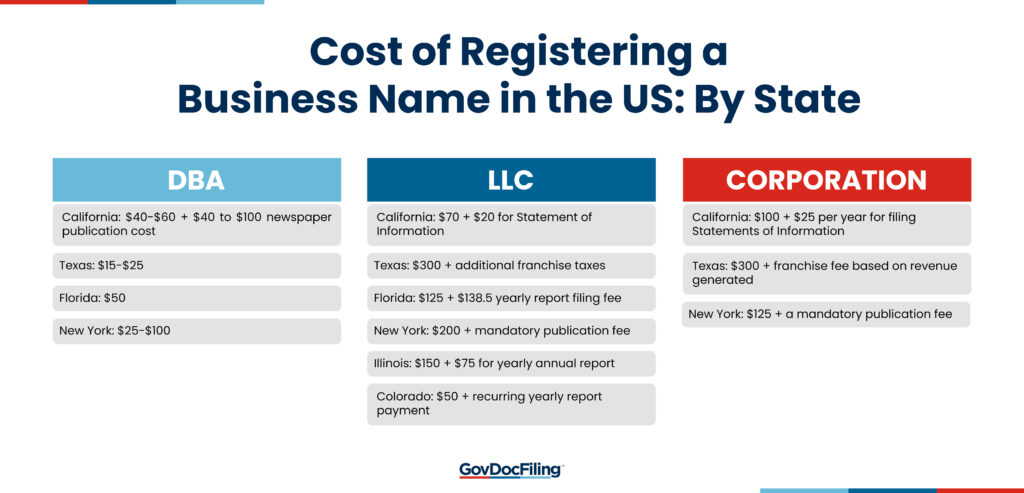
How much does it cost to register a business name in the US? The cost depends on several factors. However, business name registration fees typically range from $10 to $150, depending on the state and the type of registration.
Here’s a state-by-state breakdown of what you can expect to pay.
DBA Registration Fees
For individuals running their own businesses or those in partnerships who want to conduct business using a name other than their personal name or official partnership title, filing a “Doing Business As” (DBA) registration is required.
Here’s a breakdown of registration fees across various states:
- California: Filing a DBA generally falls between $40 and $60, though prices may vary outside this range. Additionally, many jurisdictions require you to announce your DBA in a local newspaper, with publication costs typically ranging from $40 to $100, varying by newspaper outlet.
- Texas: The fee for a DBA varies according to the county and ranges from $15 to $25.
- Florida: A DBA filing costs $50 in the state.
- New York: DBA fees range from $25 to $100. Fees are often higher in New York City.
Several states implement mandatory registration renewal policies. For instance, California business owners must update their registration once every five years, which involves paying renewal charges.
LLC Registration Fees
When establishing a Limited Liability Company, the business name registration is automatically included as part of submitting your formation documents and legally creating your company. The registration fees vary depending on your state:
- California: The online LLC formation fee is $70, with an extra $20 required for the Statement of Information submission. You’ll need to file this statement three months after creating your LLC and then once every 24 months.
- Texas: To establish an LLC, you’ll need to invest $300, and keep in mind you might have to pay additional franchise taxes.
- Florida: Establishing an LLC involves two fees: a $125 one-time registration charge and a $138.75 yearly report filing fee.
- New York: Setting up an LLC involves two costs: a fixed $200 registration charge and a mandatory publication fee, which fluctuates according to media rates.
- Illinois: To form an LLC, you’ll need to invest $150 for the initial registration, with an additional $75 fee that’s due yearly for the annual report.
- Colorado: The price tag for establishing an LLC is $50, along with a recurring yearly report payment.
Also Read:
Corporation Registration Fees
Establishing a corporation (whether C-corp or S-corp) generally requires a larger initial investment than starting an LLC. The financial commitment varies depending on your location, with each state having its own fee structure:
- California: A corporation costs $100, plus $25 per year for filing Statements of Information.
- Texas: In this state, forming a for-profit corporation costs $300. A franchise tax is applied annually based on the revenue generated.
- New York: A business incorporation costs $125 plus a mandatory publication fee.
Also Read:
Now that you know what it costs to register a business name in the US, let’s discuss the mistakes you need to avoid.
Common Mistakes to Avoid When You Register a Business Name
Not Conducting a Thorough Name Search
Poor name selection can derail a business before it even starts. Many entrepreneurs fall into the trap of choosing names that are too similar to existing businesses or rely heavily on common industry terms.
This not only creates confusion in the marketplace but can also lead to legal challenges from established brands. For instance, naming your coffee shop “Starbeans” might seem clever, but it’s asking for trouble.
Also Read:
Ignoring Digital Presence
We live in a digital-first world. Hence, failing to secure matching domain names and social media handles simultaneously before your register a business name can leave you scrambling later.
Imagine you successfully register a business name and later find out that your ideal domain name is taken. This would force you to use a less professional alternative that could confuse customers.
Also Read:
Legal Compliance Oversights
Legal compliance issues often arise from a lack of understanding of multi-jurisdictional requirements.
Many business owners don’t realize that even if they register a business name in one state, it doesn’t automatically protect it in another. They might also miss out on crucial DBA name filings, which can result in costly legal corrections and potential business disruptions.
Keep copies of all submitted state documents for your records to ensure compliance with local laws after registering your business name.
When you register a business name, you should also ensure you choose a name that follows the state laws and naming conventions.
Insufficient Protection
Simply registering a business name doesn’t provide comprehensive protection. Many business owners skip the crucial step of trademark registration or fail to maintain their registrations across all states where they run their businesses.
This oversight can lead to expensive legal battles or forced rebranding if another business claims rights to the name.
Poor Documentation
Another common mistake people make when they register a business name is omitting important documents. Documentation negligence is a surprisingly common issue where business owners fail to maintain proper records of their registration process.
Missing filing deadlines, losing copies of important registration documents, or keeping records incomplete can create significant headaches during audits, sales, or legal proceedings.
Registration Timing Issues
Some entrepreneurs start operating their business before properly registering their name, while others wait too long and lose their desired name to another business. Proper timing is crucial, and rushing through the process or procrastinating can lead to problems.
Geographic Limitations
Geographic limitations often become apparent only after it’s too late. While a location-specific name like Manhattan Marketing Solutions might seem perfect initially, it could become a liability when expanding to other regions.
Additionally, some names might carry unintended meanings or negative connotations in different languages or cultures.
Also Read:
Renewal Oversights
These are common long-term mistakes people make when they register a business name. Many business owners don’t realize that name registrations and trademarks require periodic renewal.
Failing to calendar these important dates or missing renewal deadlines can result in the loss of name rights and the need for expensive re-registration processes.
To avoid these pitfalls, approach business name registration systematically, consult legal professionals when needed, and maintain proper documentation.
Frequently Asked Questions
1. How much does it cost to register a business name in the US?
The amount it costs to register a business name in the US depends on several factors. One of such factors is the type of business registration. For example, a DBA registration usually costs between $10–$100 based on the state or county. Registering an LLC, including the name, can cost anywhere from $50–$500, depending on the state. Incorporating your business, including the name, can cost between $100–$500, based on the state.
2. Do I need to register or trademark my business name?
Filing your business’s trade name (commonly called a DBA, assumed name, or fictitious name) is typically required by your local jurisdiction – whether that’s at the state, county, or municipal level. While registering a DBA doesn’t automatically grant legal protections, it’s mandatory in most states if you operate under a name different from your legal business name.
3. Can I just use my name as a business name?
Yes, using your personal name for your LLC is permitted, but legal professionals advise always appending “LLC” whenever referencing your business entity to maintain proper identification.
4. What is the difference between a DBA and an LLC?
Selecting your business structure is a key decision when launching your venture. While operating under a DBA (doing business as) involves lower maintenance costs, forming an LLC (limited liability company) provides enhanced advantages and legal safeguards.
5. Do I need an LLC and a trademark?
For comprehensive legal protection, businesses should utilize both LLC formation and trademark registration. The LLC structure safeguards your personal property from business-related lawsuits, while trademark protection prevents unauthorized use of your company’s brand elements.
Wrapping Up
There you have it—how to register a business name and the pitfalls to avoid. Starting a business without registering its name is like building a house without a proper foundation—risky and potentially disastrous.
So, ensure you register a business name properly. Also, make sure you have a business plan to successfully launch and grow your new business, whether it’s a sole proprietorship or an LLC.
Check out this infographic below if you need further guidance.


